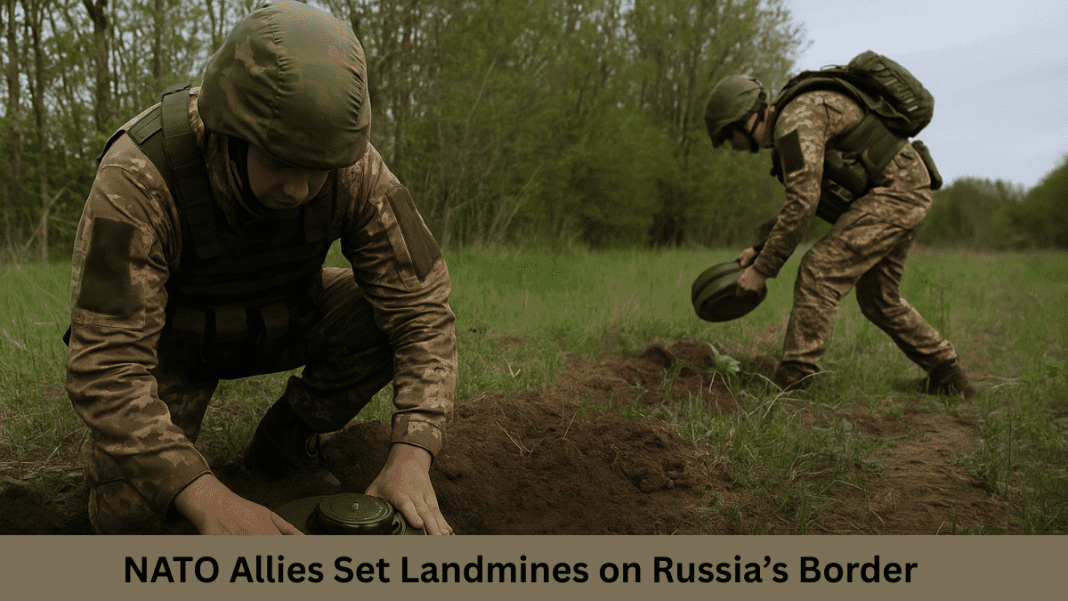A powerful shift is taking place in Europe. Six countries that share borders with Russia—Ukraine, Poland, Finland, Estonia, Latvia, and Lithuania—are taking steps to reintroduce anti-personnel landmines along their eastern borders.
NATO’s Eastern Front Turns to Landmines Amid Russian Threat
These countries are leaving the Ottawa Treaty, a global agreement signed in 1997 to ban landmines. The reason? Growing fears of a possible Russian invasion.
The Ottawa Treaty, also known as the Anti-Personnel Mine Ban Convention, came into effect in 1999. It banned the use, production, and stockpiling of landmines. Over the years, 165 countries have signed the agreement. But recent security concerns have forced some nations to rethink.
Since March 2025, these six countries have started to withdraw from the treaty. Ukrainian President Volodymyr Zelenskyy signed a decree on June 29 to begin Ukraine’s exit. The Ukrainian Parliament must still confirm it. Poland completed its withdrawal on June 26. Finland announced its departure earlier on April 1. The Baltic states—Estonia, Latvia, and Lithuania—also made similar decisions.
Finland and Lithuania to Produce Anti-Personnel Mines—Here’s Why It Matters
These countries argue that the treaty’s restrictions prevent them from defending their borders properly. In a statement, Ukraine’s Foreign Ministry said the country is in an “unequal and unjust” situation that limits its right to self-defense. They referred to Article 51 of the United Nations Charter, which gives all nations the right to defend themselves.
Finland’s Prime Minister explained that the country needs flexibility to deal with today’s security challenges. Lithuania’s Defense Minister described Russia as an “existential threat” and announced that Lithuania would invest €800 million to produce its own landmines.
Landmines Return as Part of a New “Iron Curtain”
The borders between NATO countries and Russia are often uninhabited, forested, and hard to monitor. These regions stretch for over 3,500 kilometers—from northern Finland to eastern Poland. Because these areas are so remote, officials worry that they are vulnerable to surprise attacks.
To make things more secure, military leaders are planning what’s being called a new “Iron Curtain.” This name refers to a defense line made of landmines. It echoes the term used during the Cold War to describe the heavily guarded boundary between the Soviet Union and Western Europe.
Officials believe landmines can act as an affordable and effective way to stop enemy forces. Unlike advanced weapons, landmines don’t need soldiers to operate them constantly. Once placed, they can protect large areas for long periods.
Poland and 3 Baltic Nations Withdraw from Landmines Ban Treaty Amid Rising Threats
NATO countries also feel that Russia’s actions in Ukraine have shown how dangerous landmines can be. After Russia’s invasion in 2022, around 25% of Ukrainian territory became unsafe due to landmines. That region is roughly twice Austria’s size. Nowadays, Ukraine is thought to be the nation with the largest mining activity worldwide.
Despite the Ottawa Treaty, Russia never signed the agreement. In 2004, Russia admitted to having 26.5 million landmines in stock. Many of these have now been used in Ukraine. Some have even been found in other countries like Tajikistan, which did sign the treaty. This shows that Russia never stopped relying on landmines as part of its military plan.
Ukrainian President Zelenskyy said in a video speech on June 28 that landmines are often the only tool that can provide strong defense. He charged that Russia has killed and maimed civilians through the “cynical” use of mines.
Countries Prepare for Landmine Production and Deployment
The shift away from the Ottawa Treaty is not just about policy. It’s also about action. Countries like Finland and Lithuania announced on July 9 that they plan to start producing landmines by 2026. These mines will likely be used to protect their own borders and may also be supplied to Ukraine.
Poland, Latvia, and Estonia are also expected to begin landmine production soon. These countries have made it clear: they are ready to use any tool necessary to defend their people and land.
In a joint statement, the defense ministers of Poland, Lithuania, Latvia, and Estonia declared, “This decision sends a strong signal—our nations are ready and willing to take all necessary steps to protect our security.”
This new defense line, made up of millions of landmines, is meant to send a strong signal to Russia. NATO countries are not passive. They are actively preparing their territories for any potential threat.
War Readiness: Poland’s Aggressive Push for Mandatory Military Training
Military experts say that Ukraine’s decision sets a precedent. If Ukraine, a country facing daily attacks, sees landmines as a necessity, other frontline countries may follow. Ukraine has already suffered the loss of 13,300 civilians, with more than 32,700 injured since the full-scale war began.
Defense specialists in Europe warn that if Russia is not stopped in Ukraine, it could turn its attention to other countries like the Baltic states, Poland, or Finland. That makes today’s actions even more urgent.
The growing belief is that landmines, though dangerous and long avoided, are once again becoming a crucial part of Europe’s defense strategy. As the border between NATO and Russia hardens with these hidden weapons, a new and serious chapter in European security has begun.

